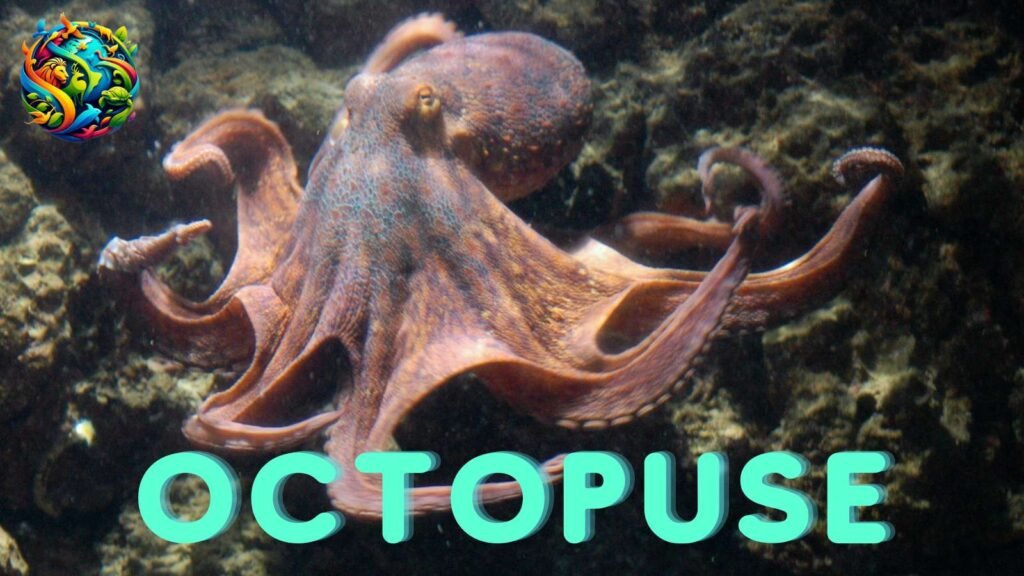Octopus: Masters of the Ocean Depths
Introduction:
They are among the most fascinating and intelligent creatures in the ocean. These soft-bodied molluscs belong to the class Cephalopoda, making them relatives of squids and cuttlefish. With their incredible problem-solving abilities, camouflage skills, and unique anatomy, they have captivated marine biologists and ocean enthusiasts for centuries. Their presence in myths, literature, and modern science continues to intrigue humanity.
Amazing Facts:
- Eight-Armed Intelligence: Each arm has independent neural control, allowing them to perform different tasks simultaneously.
- Masters of Disguise: They can change their skin colour and texture within seconds to blend with their surroundings.
- No Bones, No Limits: Their boneless body enables them to squeeze into the tiniest crevices.
- Three Hearts: Two pump blood to the gills, while one circulates it through the rest of the body.
- Blue Blood: Instead of iron-based haemoglobin, their blood contains copper-rich hemocyanin, making it blue.
- Ink Defence: When threatened, they release ink to create a smokescreen against predators.
- Short-Lived: Despite their intelligence, most species live only 1–2 years.
- Regeneration: If they lose an arm, they can regrow it completely.
Habitat and Diet:
They inhabit all the world’s oceans, from shallow coastal waters to deep-sea environments. They prefer rocky crevices, coral reefs, and underwater caves where they can hide from predators. Some species, like the deep-sea Dumbo octopus, are found at depths of over 4,000 meters.
Their diet consists mainly of:
- Crabs
- Shrimp
- Fish
- Mollusks
- Small marine creatures
They are skilled hunters, using their tentacles and powerful beaks to capture and crush prey. Some species even inject venom to paralyze their food.
Appearance:
They have a distinct and unusual appearance:
- Soft, boneless body: Allows them to squeeze into tight spaces.
- Eight Long Arms: Each covered in suction cups for grasping objects.
- Large, Complex Eyes: Provide exceptional vision, even in dim waters.
- Beak-like Mouth: Used to break open shells of prey.
- Colour-Changing Skin: Contains chromatophores that enable instant camouflage.
- Jet Propulsion: They propel themselves by expelling water through a syphon.
Types and Subspecies of Octopuses:
There are over 300 species of them, categorised into different genera:
- Common Octopus: Found in shallow coastal waters worldwide.
- Giant Pacific Octopus: The largest species, found in the Pacific Ocean.
- Blue-Ringed Octopus: small but highly venomous, found in the Indo-Pacific region.
- Mimic Octopus: Known for impersonating other marine creatures.
- Dumbo Octopus: deep-sea octopus with ear-like fins resembling the Disney character Dumbo.
- Caribbean Reef Octopus: brightly coloured, found in tropical waters.
- Argonaut (Argonauta): A pelagic octopus known for producing a paper-thin shell.
Predators and threats:
Natural predators:
Threats:
They have developed various defence mechanisms, such as ink clouds, camouflage, and jet propulsion, to evade these threats. However, their greatest threat is human activity, including:
- Overfishing
- Habitat destruction
- Climate change
- Pollution
Mating and reproduction:
Their mating is a fascinating yet tragic process. Males use a specialised arm called a hectocotylus to transfer sperm packets into the female’s mantle. After fertilisation, females lay thousands of eggs in hidden nests and guard them fiercely.
During this time:
- The female stops eating and dedicates herself entirely to protecting her eggs.
- Once the eggs hatch, she dies shortly afterward due to biological programming.
- Males also die soon after mating, making most species solitary throughout life.
How do they communicate?
They use several methods to communicate, including:
1. Color Changes
- Dark colours indicate aggression or fear.
- Bright patterns may signal curiosity or readiness to mate.
- Camouflage helps them blend into their environment.
2. Body Posture
- Raised arms can indicate a defensive stance.
- Flattened bodies suggest submission or hiding.
3. Ink Clouds
- Used as a visual signal or a distraction during escapes.
4. Physical Gestures
- Some species use touch to interact with each other.
5. Bioluminescence
- Deep-sea octopuses use light-producing cells to communicate in dark environments.
Movies Featuring Octopus:
They have been featured in several films, often depicted as intelligent and mysterious creatures. Some notable movies include:
- Finding Dory (2016): Features “Hank,” a clever seven-armed octopus.
- Pirates of the Caribbean: Dead Man’s Chest (2006): introduces the Kraken, an octopus-like sea monster.
- 20,000 Leagues Under the Sea (1954): Features a giant squid fight, sometimes mistaken for them.
- My Octopus Teacher (2020): A documentary exploring the bond between a diver and a wild octopus.
- Octopussy (1983): A James Bond film referencing the creature in its title.
How would you pronounce it in different languages?
- English: Octopus
- Spanish: Pulpo
- French: Poulpe
- German: Krake
- Italian: Polpo
- Japanese: Tako (タコ)
- Korean: Mun-eo (문어)
- Chinese (Mandarin): Zhangyu (章鱼)
- Hindi: Aathbunwa (आठबुनवा)
- Arabic: Akhtabut (أخطبوط)
FAQs:
1. Are they intelligent?
Yes, they are one of the most intelligent invertebrates, capable of problem-solving, tool use, and escape strategies.
2. How long do they live?
Most species live 1-2 years, while larger species like the Giant Pacific Octopus can live up to 5 years.
3. Can they recognise humans?
Yes, studies show they can recognise individuals and develop preferences for certain people.
4. Are they dangerous to humans?
Most species are harmless, but the Blue-Ringed Octopus carries venom that can be fatal to humans.
5. Can they survive outside water?
Only for short periods. They can crawl on land for brief moments to escape predators or search for food.
6. Do they have emotions?
While not confirmed, they display behaviours indicating curiosity, playfulness, and problem-solving abilities.
7. What do they do when they feel threatened?
They camouflage, eject ink, or quickly escape using jet propulsion.
8. Are they related to squid?
Yes, both belong to the class Cephalopoda and share common evolutionary traits.
This article comprehensively covers everything about octopuses, from their behaviour to their cultural significance. Let me know if you’d like any modifications!

